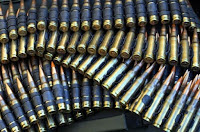 On September 8, 1974, I was 11 years old and was just beginning the 7th grade. My father was an ardent Nixon supporter and defender of the Vietnam War, and my mother one of Nixon's "silent majority" supporters. I was old enough to know that the past summer's Watergate hearings were historically very important, and that I should be watching them - but I found the narrative and details confusing and kind of boring (after all it was summer and I was 11). I was basically a conservative kid, growing up in a conservative Catholic household in the South. At the time I looked with awe upon all US presidents, thought Kissinger was a genius, and figured that our country had to be doing the right thing in Vietnam--in other words to say I was no Nixon critic is an understatement.
On September 8, 1974, I was 11 years old and was just beginning the 7th grade. My father was an ardent Nixon supporter and defender of the Vietnam War, and my mother one of Nixon's "silent majority" supporters. I was old enough to know that the past summer's Watergate hearings were historically very important, and that I should be watching them - but I found the narrative and details confusing and kind of boring (after all it was summer and I was 11). I was basically a conservative kid, growing up in a conservative Catholic household in the South. At the time I looked with awe upon all US presidents, thought Kissinger was a genius, and figured that our country had to be doing the right thing in Vietnam--in other words to say I was no Nixon critic is an understatement.But, I do distinctly remember being stunned when the new President gave a full and complete pardon to Nixon on that fateful September day. I had been raised under the the naive American ideal that no one (not even the President) was above the law - and yet here was a man who was clearly being put, not only above the law, but out of the reach of the law. As time went on, it would only goad me even more that the pardon allowed Nixon to live off of the taxpayers on a generous pension that far exceeded the salaries my working parents ever attained, and allowed him to worm his way back into the public sphere as an "elder statesman" instead of the enemy of the Constitution that he clearly was. I'd say he made out pretty well with the help of his dear friend, Gerald Ford.
So now, more than 30 years later, I have to hear the Gerald Ford love-fest on NPR day after day. How many times have I heard them replay Ford's hypocritical statement, "My fellow Americans, our long national nightmare is over. Our Constitution works; our great Republic is a government of laws and not of men." I've yet to hear one NPR reporter comment on the sad irony of that phrase "laws and not of men" - when Ford in fact turned that on its head just a month into his presidency by protecting the man from facing accountability of the laws.
Personally, I could care less about "hating Nixon" or the desire for revenge, but what irks me about NPR's slavish coverage of the legacy of Ford's pardon is its complete lack of consideration of how it has encouraged further presidential attacks on the Constitution--Reagan's shadowy shredding of checks and balances to fund his drug-running thugs known as the Contras, and of course George W. Bush's more overt assaults on basic Constitutional rules such as habeus corpus and unreasonable search and seizure protections. In my opinion Ford's pardon set a precedent of impunity that has emboldened Constitutional outlaws who gravitate to the White House, offering them the knowledge that they will never be held account for their high crimes and misdemeanors.
Oddly enough, one of the best articles I've found on the Ford pardon is in Slate which co-produces Day to Day with NPR. So maybe NPR could bring on the author of the article, Timothy Noah, for a little corrective angle on the infamous Ford Pardon. But I doubt they will.




































